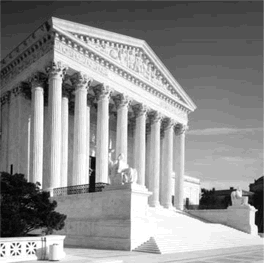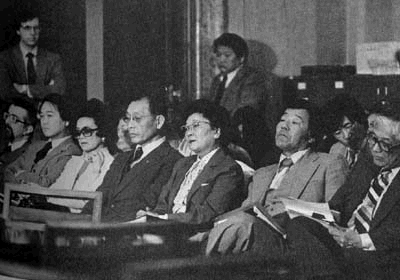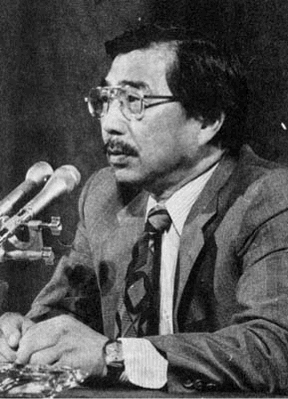
|
The Court Cases |

| Many
Japanese Americans did not want to question that their rights had been evoked.
They concluded that it would be better just to accept their fate as
eventually justice would prevail. However there were three young men and
one young woman, respectively Minoru Yasui, Gordon Hirabayashi, Fred
Koramatsu and Mitsuye Endo, who were not prepared to accept that the
United States had any right to intern them in the name of military
security. Hirabayashi was aware that his “position…was not
popular”. (G. Hirabayashi quoted in Race, Rights and Reparations,
Yamamoto et al, 2001, Aspen Law and Business.
The cases were independent from each other.
In
June 1943, Minoru Yasui wanted to be arrested by the police so he could
take the United States to court. After many hours he finally took
himself to a police station and insisted that he be arrested for curfew
violation. The JACL opposed the case, who were strongly in favor of
obeying the military orders. In the first case, Judge Fee agreed that
the curfew orders were unconditional as applied to U.S. citizens, but
found that Yasui had renounced his citizenship indirectly by working for
the Japanese Embassy. The case was
taken to the Supreme Court who ruled in favor of the government.
Hirabayashi also violated the curfew and once again the Supreme Court ruled in favor of the United States. In 1944 Koramatsu had not gone to the interment camps. It was not because of any principal that he had, but rather because he wanted to stay with his young Caucasian love, he even had plastic surgery to try avoid internment. However he was eventually arrested and charged. Also in 1944 Mitsuye Endo had a slightly different case. She had committed no crime and she went to the Internment camp. She petitioned a writ of habeas corpus, and seeking liberation from the camps which she perceived to be unlawful. Her case forced the Supreme Court to deal directly with the internment camps, which the previous cases did not. They concluded that she had the right to her freedom because she had proved her loyalty. Perhaps the decisive factor was that the Endo' case was not a military trial, unlike the three previous cases. General Witt was a racist figure. "A Jap is a Jap" |
 |
The National Council for Japanese American Redress was founded in May 1979 to seek damages for the suffering of internment. It was headed by William Hohri. In 1983 with other internees, he accused the federal officials for conspiring to deprive Japanese Americans from their rights. On the 10 of July 1970, the JACL called for reparations. In their paper titled “A Requital Supplication” they intend for Congress to award |
| individual compensation. Edison Uno is a key figure It wasn't until the 1980's that there began an attempt to revert the Supreme Court rulings. As a rule cases can not be retried after 7 years unless you can prove that the government lied. The grounds for reopening the trials were based on a writ of "error corum nobis" that was facilitated by "manifest injustice" to the defendant and "fundamental error in the proceeding". So this what the Federal Commission on Wartime Relocation and Internment of Civilians, attempted to do. Working between 1980 and 1982 they spent much time sorting out the legislation. They concluded that the internment camps had been based on racist intention and thus not for military reasons. In July 1981, the Commission on Wartime Relocation and Internment of Civilians held hearings across the United States. |
|
t was discovered that the military had destroyed documents regarding the internment camps. It was concluded that General De Witt's testimony in the Kormatsu case in 1944 was based on racist beliefs and he offered conclusions rather evidence. General De Witt was not an expert on social affairs to offer a court testimony. The JACL again did not support this action. They felt to ask for compensation was to "cheapen liberty by putting a price tag on it". They also did not want to jeopardize the relationship that had been re-established between the US government and Japanese Americans after the Second World War. It was discovered that the military had destroyed documents regarding the internment camps. |
 |
|
It was concluded that General De Witt's testimony in the Kormatsu case in 1944 was based on racist beliefs and he offered conclusions rather evidence. General De Witt was not an expert on social affairs to offer a court testimony. The JACL again did not support this action. They felt to ask for compensation was to "cheapen liberty by putting a price tag on it". They also did not want to jeopardize the relationship that had been re-established between the US government and Japanese Americans after the Second World War. In 1988 January 12 the ruling in Hirabayashi v U.S. finally vacates Hirabayashi's convictions for resisting curfew and evacuation orders. Also in 1988 Ronald Reagan publicly apologized to those of Japanese Ancestry and also paid reparations to those who were still alive. He also passed the 'Civil Liberties Act of 1988'. On 9th October 1990, the first nine redress payments were made. Not everyone agreed with the reparations, for example some refused the money, although most accepted the apology.
|